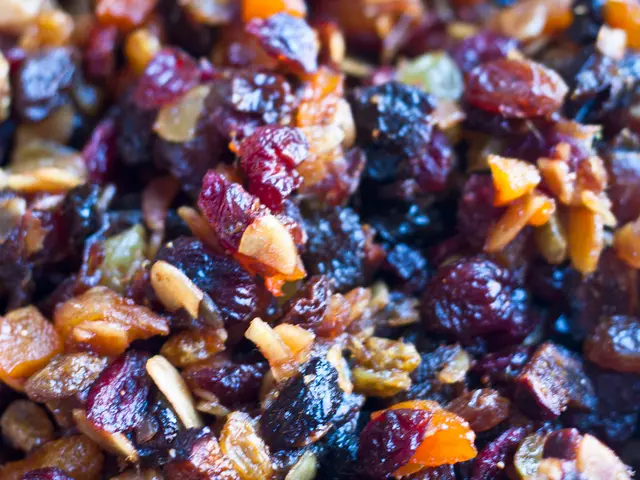Selecting Appropriate Carbohydrates and Their Dietary Impact: A Guide to Healthy Choices
Cracking the Carb Combo: Complex vs Simple Carbs for Your Well-being
Getting real about the good, the bad, and the nutritious world of carbs
Carbs, oh carbs! They're the fuel that keeps our bods humming, powering brain functions, muscles, and much more. But not all carbs are born equal—it's essential to know the difference between complex and simple carbs to stay fit, healthy, and energized. Buckle up!
Complex Carbs, the Superheroes of Nutrition
These legends of the carb world include whole grains (like quinoa, oats, buckwheat), veggies (broccoli, spinach, zucchini), and legumes (chickpeas, lentils, beans). These slow-burning heroes take their time to digest, providing sustained energy and a feeling of fullness for longer.
Why is this lovely little trait so useful? Well, complex carbs are like your ultimate health pals, packing in fiber, vitamins, and minerals. Don't knock these power couples until you've tried 'em!
Pit-stop: Key benefits of complex carbs are:
- Satiety and Weight Management – With their fiber-rich appeal, complex carbs help keep cravings at bay and keep your weight in check.
- Blood Sugar Regulation – By slowly releasing glucose, these carbs deliver a steady supply of energy and keep those sugary highs and lows under control.
- Nutrient Powerhouse – B vitamins, potassium, carotenoids, and flavonoids—complex carbs are chock-full of good stuff that's great for your health.
- Digestive Health – Fiber, glorious fiber! It helps purge the bathroom while maintaining a happy, healthy gut.
- Cholesterol Management – With a dash of fiber, complex carbs help keep cholesterol levels in check and guard your ticker.
- Energy Stability – By gradually releasing energy, complex carbs help maintain your energy levels and avoid unwanted crashes.
Simple Carbs, the Tricky Treats
When carbs don't take their time (sweets, white flour, and fried foods), they can cause a sugar rush followed by a crash. This can leave you feeling sluggish and hungry soon after. Oops!
Time for a change of pace: swapping simple carbs for complex ones can help you stay energized and satisfied while enjoying better health. Fruits and veggies offer simple carbs with dietary fiber and micronutrients, making them more nutritious than their processed counterparts.
Remember: skipping carbs altogether is a no-go! Your body needs carbs for fuel, and neglecting them can lead to weakness, impaired bodily functions, and cognitive impairment.
Dietary Fiber: The Real Game-changer
Belonging to the complex carb family, fiber plays a pivotal role in digestion, supporting gut health and slowing sugar absorption. It's recommended to consume between 20 to 60 grams of fiber per day for optimal health.
While planning your diet, tailor carb intake to your individual needs, considering age, sex, and activity level. The perfect balance isn't one-size-fits-all, but many dietitians suggest a ratio of 40% carbs, 30% proteins, and 30% fats as a good starting point.
Make informed carb choices and enjoy them in moderation to maintain a healthy weight and steer clear of unnecessary weight gain. Go for those slow-release carbs, like whole grains, veggies, and legumes, for a wellness-boosting lifestyle!
- For optimal health and sustained energy, embrace complex carbs like whole grains, vegetables, and legumes, which provide a plentiful amount of fiber, vitamins, and minerals.
- To support weight management, blood sugar regulation, digestive health, cholesterol management, and energy stability, it's essential to favor complex carbs over simple carbs found in sweets, white flour, and fried foods.
- To promote a healthy-diets lifestyle, make informed carb choices by incorporating fiber-rich complex carbs into your daily meals while maintaining a balanced diet that includes 40% carbs, 30% proteins, and 30% fats.








